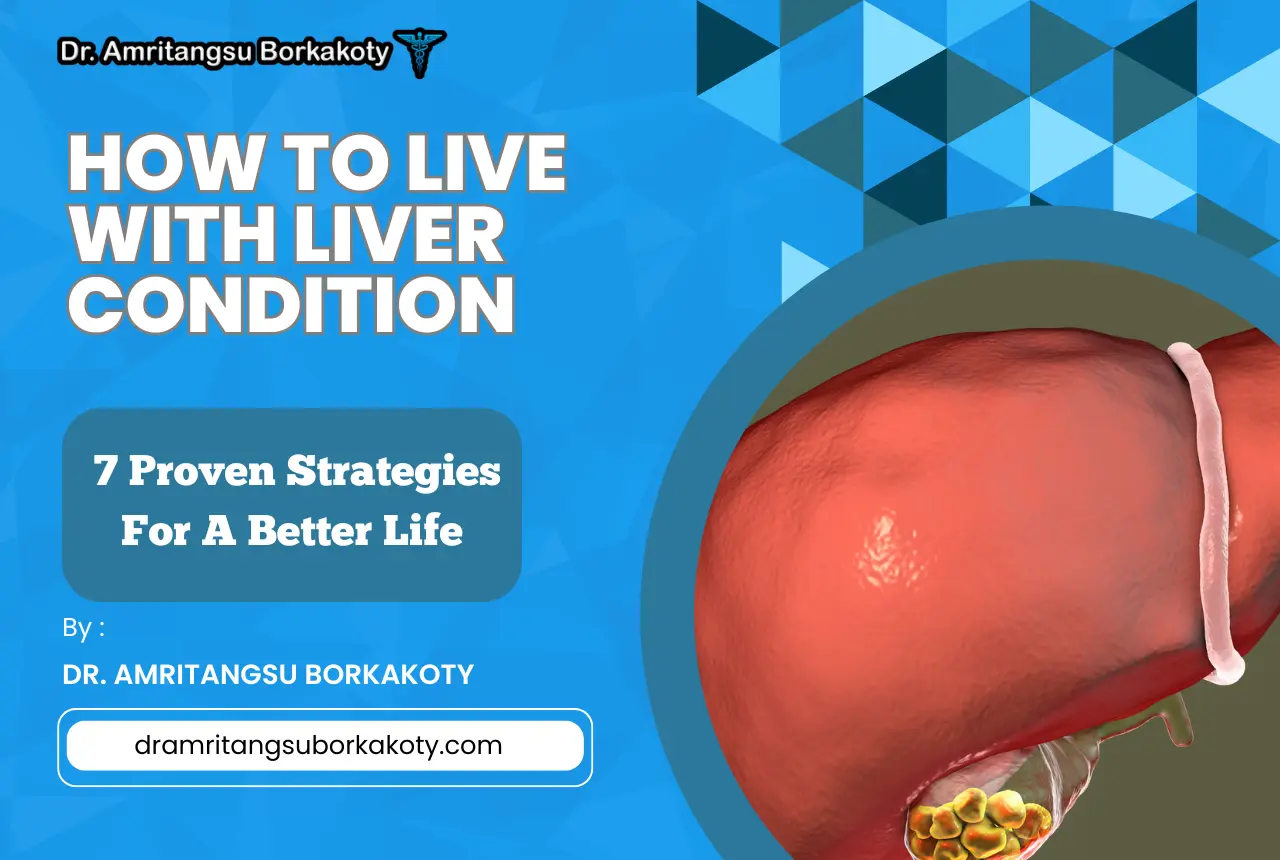
-
 Posted By Dr. Amritangsu Borkakoty
Posted By Dr. Amritangsu Borkakoty -
-
Comments 0
Our liver is a silent powerhouse, working tirelessly behind the scenes to keep us healthy. It filters toxins from our blood, produces essential proteins, and regulates our metabolism, all while churning out bile to aid digestion.
But like any hardworking machine, our liver can sometimes face challenges. Liver conditions are surprisingly common, affecting millions worldwide.
The good news is that with proper management, you can live a full and happy life even with a liver condition. This blog post will explore seven proven strategies that will educate you How to live with liver condition and feel your best.
Remember, a holistic approach is key, and working closely with your healthcare professional will guide you on the best path for your specific needs.
So, How to Live with Liver Condition?
Living with a liver condition requires a holistic approach that prioritizes both your physical and mental well-being. This means nourishing your body with a liver-friendly diet rich in fruits, vegetables, whole grains, and lean protein while limiting unhealthy fats and processed foods.
Regular exercise is vital for blood sugar control and weight management, both of which benefit your liver. Prioritizing quality sleep allows your liver to repair and regenerate, while stress management techniques like yoga or meditation can help combat the negative effects of chronic stress.
Working collaboratively with your healthcare professional is essential. Regular checkups allow them to monitor your liver function and adjust your treatment plan as needed. They can also be a resource for personalized dietary guidance and safe exercise routines tailored to your specific condition and limitations.
By embracing a holistic approach and partnering with your doctor, you can empower yourself to thrive and live a fulfilling life despite your liver condition.
1. Maintain a Healthy Diet

Think of your diet as fuel for your liver. Just like a high-performance engine, your liver thrives on a balanced and nutritious diet. Here’s what to keep in mind:
- Fill your plate with colors: Fruits and vegetables are packed with antioxidants that help your liver fight off damage. Aim for a rainbow on your plate with a variety of fruits and veggies.
- Choose whole grains over refined ones: Brown rice, quinoa, and whole-wheat bread provide sustained energy and essential fiber, which can help with weight management.
- Lean protein is your friend: Opt for protein sources like fish, chicken, beans, and lentils. They provide the building blocks your body needs without overloading your liver.
- Limit the “bad stuff”: Sugary drinks, processed foods, and unhealthy fats like saturated and trans fats put extra strain on your liver. Keep these to a minimum.
- Portion control is key: Even healthy foods can be problematic in excess. Pay attention to serving sizes and avoid overeating. Maintaining a healthy weight can significantly benefit your liver health.
2. Exercise Regularly

Getting your body moving is a fantastic way to support your liver health. Exercise helps regulate blood sugar levels, which can reduce stress on your liver. It also aids in weight management, another crucial factor. Here’s how to incorporate exercise:
- Aim for moderate intensity most days: Brisk walking, swimming, cycling, or dancing are all excellent choices. Find activities you enjoy and aim for at least 30 minutes of moderate-intensity exercise most days of the week.
- Listen to your body: If you have limitations, don’t push yourself too hard. Talk to your healthcare professional about modifications or low-impact exercises that are safe and effective for you.
3. Get Enough Sleep

A good night’s sleep isn’t just a luxury; it’s essential for overall health, including your liver. During sleep, your body goes into repair mode, allowing your liver to rest and regenerate.
- Aim for 7-8 hours of quality sleep: Develop a consistent sleep schedule and create a relaxing bedtime routine to wind down before hitting the hay.
- Do not go to bed right after dinner: Going to bed right after dinner can disrupt our sleep as it can lead to bloating and gas formation in the middle of the night.
4. Manage Stress Effectively

Chronic stress can wreak havoc on your entire body, including your liver. When you’re stressed, your body releases hormones that can damage liver cells. Here are some strategies to combat stress:
- Find your zen: Explore stress-management techniques like yoga, meditation, or deep breathing exercises. These practices can help calm your mind and body.
- Build a strong support system: Surround yourself with positive and supportive people who can help you through tough times. Don’t be afraid to ask for help when you need it.
5. Avoid Alcohol and Tobacco:

These substances are major culprits when it comes to liver damage. Alcohol is metabolized by the liver, and excessive consumption can lead to fatty liver disease, cirrhosis, and even liver failure. Tobacco use also harms the liver and can worsen existing liver conditions.
- Quitting is the best option: If you currently drink alcohol or smoke, quitting is the single most beneficial step you can take for your liver health. There are many resources available to help you on your journey to becoming smoke-free or reducing alcohol intake. Talk to your doctor about your options.
6. Get Vaccinated and Practice Safe Habits

Prevention is always better than cure. Vaccinations can protect you from liver infections like hepatitis A and B. Additionally, practicing safe sex and taking precautions when handling medications or potentially infectious materials can minimize the risk of infections that impact your liver.
7. Regular Checkups and Medication Adherence

Staying connected with your healthcare professional is crucial for managing your liver condition. Regular checkups allow your doctor to monitor your liver function and adjust your treatment plan as needed.
- Be a medication champion: Taking your medications exactly as prescribed is vital. Don’t skip doses or stop taking medication without consulting your doctor.
Consider support groups: Connecting with others who understand what you’re going through can be incredibly beneficial. Support groups provide a safe space to share experiences, ask questions, and offer encouragement.
Conclusion
Living with a liver condition doesn’t have to hold you back from a fulfilling life. By incorporating these seven proven strategies on how to live with liver condition– maintaining a healthy diet, exercising regularly, getting enough sleep, managing stress, avoiding alcohol and tobacco, practicing safe habits, and adhering to your treatment plan – you can empower yourself to take charge of your health and live a vibrant life.
Remember, a positive outlook can make a big difference. There are many resources available to help you on your journey, including your healthcare professional, support groups, and educational websites from reputable organizations. Don’t hesitate to reach out and take control of your well-being.
Recent Posts
- Common Causes of Stomach Ulcers and Effective Treatment Options
- Early Symptoms of Liver Damage: How to Spot the First Warning Signs Before It’s Too Late
- Best Treatment for Hepatitis B and C: Your Complete Guide to Symptoms, Care, and Prevention
- How to Reduce Liver Inflammation Fast: 5 Proven Tips for Rapid Liver Recovery
- Why You Shouldn’t Ignore NAFLD: 5 Shocking Health Risks You Need to Know



